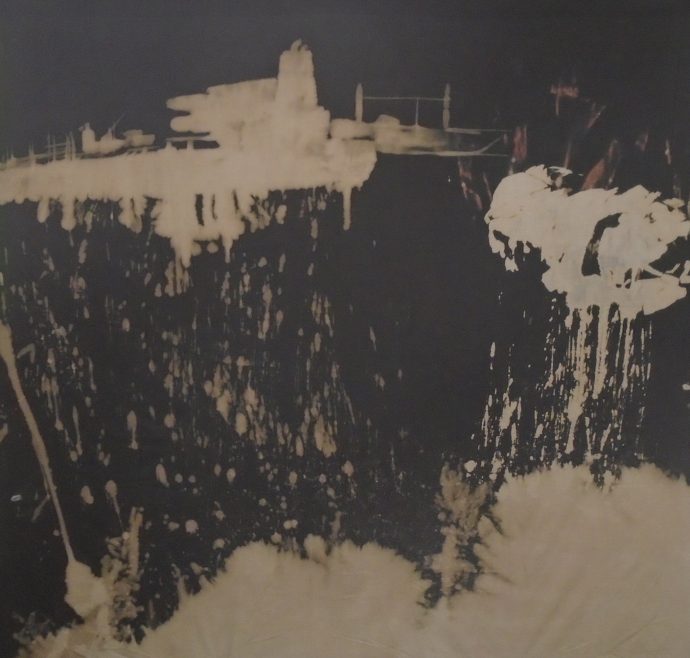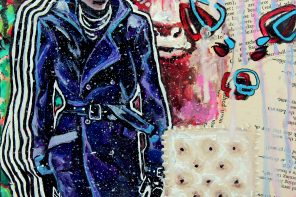The Sonnet District
& skittering from bed sheets to backdoor, steeplechasingthe furniture in less than sixty seconds. Turns out he’d been working
for the Federal Bureau of Invisible Women & his real name wasn’t Tyrone,which I should have known because when was the last time
I’d met a Tyrone in the black hole atmosphere of post- & -ish?Turns out I’d been somnambulating most of my adult life with nary a hint
of productive suspiciousness. Turns out I’d been wooed by the red wine
rhythms of inebriated verse scrawled on napkins & slipped across
the close-quartered dinner tables of out-of-the-way restaurants.
This I’d confessed to a rapt audience of new polygamists & wayward nuns
at the Center for Alternative Shakespeareans & on-again-off-again
Schizophrenics. How could I explain? I was filled with supercelestial longing
& addiction to touch. Just the brush of my ex’s arm against mine reduced me
to speechlessness, to say nothing of his dark ties & fine tailored suits falling
to the floor of my bedroom. Things got out of hand when I couldn’t
leave him without saying goodbye fourteen times, the stereospecific sparkle
of my manicure holding his chin steady beneath his closed eyes. How could I
have known the FBIW had amended its founding policies & taken to hiring men?
How could I have known the slippery slope of sentimentality would land me
in a leather straightjacket & kitten heels smashing discarded cigarettes
into interrogation room tile? “That string of strangulations in the Chauvinist District?”
(My audience leaned in closer then.) “I can’t call it.” But you best believe
there’s a spiritualizing pattern coming into alignment, the dazzling intuition
of my female species systematically undermined for the sake of a male leader.
Of course, I stole my files to burn later. The guards were distracted by the swing
of their own voices, all “mistress’ eyes” & “sun.” You best believe
I peeped the conveniently placed escape hatch in the shape of a narrow couplet
from where I sat.
It didn’t take a telescope to find that.
Sonnet for a Tall Flower Blooming at Dinnertime
Southern Flower, I want to quote the bard,
to serenade you, to raise a glass to you.
Long & tall you are always parched
& hungry. You wobble in strong winds, you
puff your bright hair when it rains, you
toss off the lint of dandelions, you
lean into the evening haunts
with your indifferent afro. You
were born in the old world city, the invisible
dark girl city, the city that couldn’t hold
a candle, a straight pin, a slave-owner’s sins
to you. You are the most beautiful
dark that hosts the most private sorrows
& feeds the hungriest ghosts.
Boy in the Forest Between Living & Leaving
For Trayvon Martin
—That time—
when boys who were down said, “down,” & dressed
in such a way that their out of school clothes resembled
their night & day clothes & play clothes & on the court
or on the field clothes those don’t-wanna-be-like-them clothes
—that time—
one boy walked alongside the dark in his dark
knee-length shorts & bulb-bright shirt that inflated
& deflated whenever the wind entered or exited the sleeves
as if to say when puffed, This is the man he will grow to be &
when shrunken to say, But he is only on the verge of it now,
& it appeared as if a narrow flame
were flaring & flickering & walking or floating alongside
a long stretch of road
because there were no street signs or landmarks
just the dark stretching
away from itself & the boy walking off walking away
rather than toward anyone or anything
though maybe that’s the way it felt when one watched another
walking from a distance, the boy kept moving
& each time it seemed as though he might stop to check
if he were headed in the right direction or wipe his hands on his shirt
or listen for rickety trucks or long rope troubles that wickedly come
the boy never stopped to be afraid
or to pull his shoestrings tighter which wouldn’t have mattered
because he wore no shoes or socks & his long feet & high arches
hinted how much taller he would become though he was already elevated
on the verge of manhood, a becoming planted in his ears
before he was born an omen an uttering or beginning of myth
& the patch of trees ahead outblacked the sky
& announced themselves & bent & swore we are safe trees
for they knew their branches had been defiled & low-hanging & long-broken &
eased into the earth the trees were weary from what they had seen
from how they had been used & could not account for the crimes
of men who had not yet atoned—
so they bent their leaf-thick heads & revealed a new path for the boy
that he might make his way to live alongside long-living boys
& just like that the boy was in a forest & the road disappeared behind him
& the boy walked further toward the shelter
of more trees away from the doomed
& damned & hunted & heckled & haunted & hounded & slaughtered & drowned &
weighted at the bottom of a river of hell
the boy outflamed the flame
he was becoming
other boys alongside other boys
he appeared to be so much & so many
he swore to sequoia & redwood, I will not burn you,
& it was true he would not raze
though the boy had brightened
the lives of the ones he loved & left
through a hole in his chest
which was like a hole in what was
& he walked right through
& upward grew
& knew he could walk
the length of floridatexasmissouriohionewyorkcalifornia & back again one day
soon is now son rise up singing one day soon is now son rise up singing one day soon
son is now son rise up singing one day soon is today son rise up swinging one day soon
is now son rise up swinging one day soon is now son rise is today son rise up swinging
& swinging he could hear singing on the other side though he knew he was gone
Yona Harvey is the author of the poetry collection, Hemming the Water, winner of the Kate Tufts Discovery Award. Her work has been anthologized in various publications including A Poet’s Craft: A Comprehensive Guide to Making and Sharing Your Poetry and The Force of What’s Possible: Accessibility and the Avant-Garde. She teaches in the University of Pittsburgh Writing Program.




